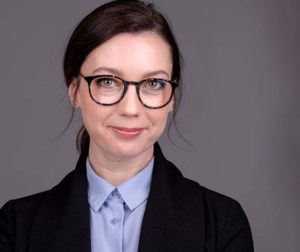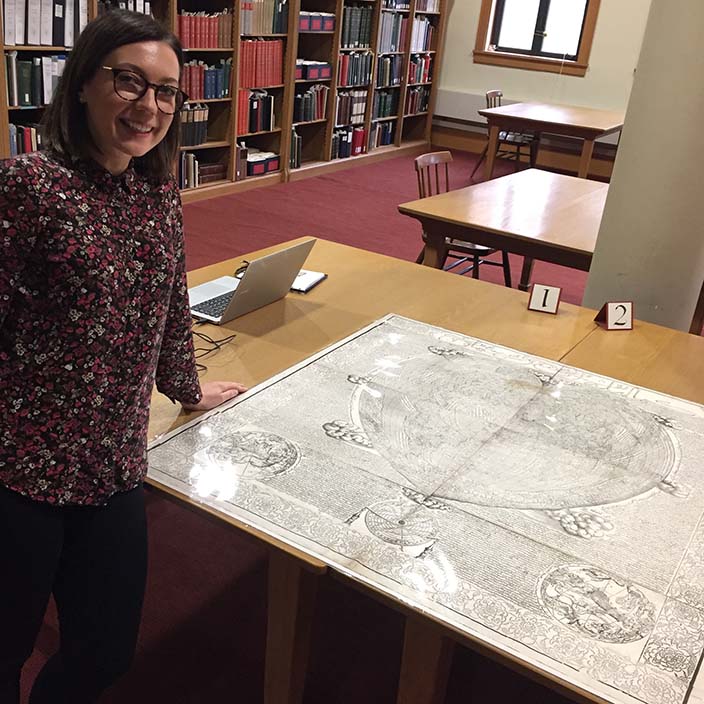Dr. Justina Spencer joins King’s community as assistant professor
 King’s is delighted to welcome art historian Dr. Justina Spencer as Assistant Professor of Early Modern Studies.
King’s is delighted to welcome art historian Dr. Justina Spencer as Assistant Professor of Early Modern Studies.
Spencer’s research interests are in European art and visual culture of the early modern period, with a specific focus on perception, and devices or objects that trick or deceive the eye. It’s a fascination she nurtured as a student at McGill University, where she first learned about ‘perspective boxes.’
Perspective boxes were a 17th century Dutch phenomenon. They were two-dimensional scenes painted inside cabinets, Spencer says. “People would look through peep-holes and see flat objects in three dimensions.” They inspired her interest in illusion and linear perspective, which became the focus of her graduate studies at McGill and Oxford Universities, as well as the basis of her upcoming book, Peeping In, Peering Out: Monocular Vision and Early Modern Art.
Only six perspective boxes are known to still exist—making them almost as rare as tenured faculty positions for early modernists. Spencer says she jumped out of her seat when she saw the job opening at King’s.
She was living in California at the time, doing post-doctoral fellowship work on her book, but was eager to return to Canada and interested in the possibility of living on the East Coast. Spencer grew up in Hudson, Que., before living in Montreal and Ottawa, and was familiar with Halifax from multiple visits here to see family.

Spencer in the Newberry Library in Chicago where she spent a month as a research fellow in 2018. She’s standing next to a 16th C. heart-shaped world map by “Haci Ahmed,” a fictitious Ottoman cartographer contrived by a Venetian artisan as a ruse to sell more copies of his work. She plans to discuss it in her upcoming class: Imagining the Other: the Portrayal of the Non-European World in Early Modern Culture
She flew to Halifax in February for interviews before travel restrictions were imposed. “I can’t believe my luck that I was able to fly to Halifax before everything shut down [due to COVID-19].”
While at King’s in February, Spencer met community members including faculty, students and staff, all of whom impressed her.
“I knew the community would be very lively. To have colleagues and students dedicated to the early modern period is tremendously exciting,” Spencer says. She was also drawn to King’s interdisciplinarity, and the fact that art history is valued and seen as integral to the humanities. And she was delighted to tour King’s Library, and learn from Librarian and Archivist Janet Hathaway that there would be space on the lower level for curatorial work her students may do. “It’s rare to have that access and space in a university for students to use,” Spencer says. But it was the students themselves that left the biggest impression on her.
“I met students for an hour at the end of the day and they got to interview me. They were amazing—so energetic and keen. They asked interesting questions about my research and intellectual trajectory. They blew me away.”
Moving to Halifax permanently last weekend was perhaps a little less amazing. Spencer immediately began her required two-week quarantine, and will have an indefinite wait before she can check out the Art Gallery of Nova Scotia, the Maritime Museum of History, and some of the city’s other cultural draws that beckon her.
She is using the wait time to start thinking about and preparing for the courses she’ll teach next year, which include Love, Lust and Desire, and Imagining the Other: the Portrayal of the Non-European World in Early Modern Culture, plus a special topics course of her creation called Art, Optics and Technologies of Illusion. She’ll also be a Foundation Year Program tutor, and will take-over King’s study abroad course in Florence, Italy.
“I’m tremendously excited about the experiential learning opportunities Halifax provides,” Spencer says. She’s already planning field trips, and talking about the deep care she will bring to making herself accessible to students. Spencer explains that she was the first member of her family to attend university, and her reverence for higher education and her professors meant she was apprehensive to spark a dialogue with them outside of class. Now a professor herself, she works hard to break that down. “I want my students to know I’m always accessible. I want them to feel that ease that I didn’t necessarily experience,” Spencer says.
Connect with Spencer on Twitter: @justinahspencer

